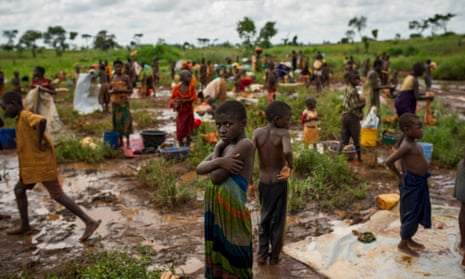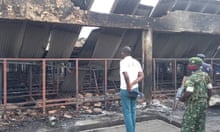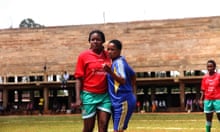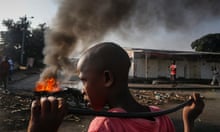Teams of thugs are slipping out of Burundi and into refugee camps in neighbouring countries to launch murderous attacks on exiles, as government militias’ campaign of terror spills over the country’s borders, survivors say.
The central African nation slid into violence last year after the president, Pierre Nkurunziza, pushed aside the constitution and ran for a third term in office. Since then more than 250,000 people have poured across its borders seeking safety in neighbouring Rwanda, Tanzania and Congo.
The exodus has been large enough for attackers to hide among the crowds along with their targets. Such is the threat – made clear in police and medical reports seen by the Guardian – that some Burundians have been moved to their refugee camp’s only guarded living area in an attempt to keep them safe.
Some say they are being targeted to prevent them from sharing their accounts of abuse in a country hovering on the brink of civil war, where thousands have been abducted, tortured, raped and killed. Others believe they are being singled out by people who want to punish family members active in the opposition.Almost all say the violence that followed them across the border is even more terrifying than what they endured at home, because now they have nowhere to run.
Claude and his family fled after armed men killed his younger brother outside their family home, gang-raped his heavily pregnant wife in front of their young son, and beat him badly. He asked that his real name not be used to protect relatives still inside Burundi from possible reprisal attacks.
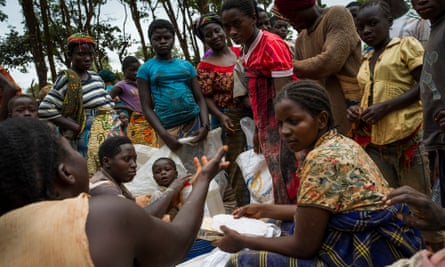
Claude says he was targeted after he resisted pressure to back a pro-government relative. A man initially demanded his identity documents so he could use Claude’s vote in the presidential poll, and ultimately tried to coerce him into serving as a driver on nighttime militia raids, he says.
Leaving was difficult and traumatic, and the family’s life in exile was dull and stressful, but it seemed a small price to pay for safety – until the week they found his torturers waiting outside church and saw one of his wife’s rapists lingering in the market in their corner of the camp.
“Where are you staying these days?” the thugs asked him after the family service on Sunday. “So you are here?” the rapist said with a grin a few days later. The nightmare they had sacrificed everything to escape had pursued them across the border.
Claude’s family reported the meetings to authorities at the sprawling Nyarugusu camp, a shanty town of 150,000 people on the Tanzanian border. The third largest refugee settlement in the world, it offers would-be killers plenty of places to hide.
Although the road in and out is closely controlled by the Tanzanian military, there are no fences around the camp, meaning residents can fan out into the surrounding brush to look for firewood, and outsiders can slip in unregistered.
The only response the family got from overstretched workers was advice to be careful. But then Claude was attacked again. He was returning to his tent one evening when someone set on him from behind and wrestled him to the ground, trying to stab and strangle him.
They rolled into a pile of rubbish together as they fought, and Claude’s attacker lost his grip, giving him a chance to run, screaming for help, towards some nearby tents.
After getting treatment for his injuries, Claude begged for help, and this time local elders decided he needed more protection. They petitioned camp authorities to move him into a more secure area.
The area is fenced off and only verified residents are allowed in and out, but security is only relative. Claude and his family have to venture out to get their supply of food and collect firewood to cook it on, and his would-be assassins know where they are.
“I am not safe in that place. Everyone knows that I am not safe,” he said. “One day I had been to get our rations, and I was going back and saw him just smoking outside. I ran.”
Aid workers and experts say they have no evidence that Burundian militias are operating inside Nyarugusu or other camps. But the overcrowded secure area, which also hosts victims of domestic violence, is evidence that some vulnerable residents are considered to be at critical risk from attackers inside the camp.
And a widespread and well-documented fear of reprisal attacks among Burundian refugees in several countries is testament to how extensive the terrifying violence inside the country has become, said Carina Tertsakian, senior researcher for Africa with Human Rights Watch.
“The refugees not only in Tanzania but also in a number of other countries are very frightened and very worried about their security even outside Burundi,” she said. “Whether those threats are real or not, it’s alarming because it shows the degree of fear that Burundians are living with because of the violence inside the country, even when they have left.”
Claude’s neighbour Sylvie lost her husband, a former government employee, after he publicly declared his support for the opposition and began organising for elections. He was shot dead outside their home.
“I heard the shots, but I didn’t know it was my husband they were killing. When I saw his body, I fainted because his face had been destroyed,” said Sylvie, 32, who also asked that her real name not be used to protect her children.
Early the next week, a man who she thinks was the killer contacted her by phone. “Please say your last prayers, because after a short time I will come to kill you,” he told her.
She fled to Tanzania and remembers a few nights of relative peace and security, until one evening when she was cooking outside their tent and someone walked up and slapped her back. He winked at her and said: “Shhh, you have to stop talking,” then walked away. It was the voice from the phone.
She reported it to police, who asked authorities to move her to a different part of the camp, a long way from her old tent. It did not take the man long to track her down again. The next month she was assaulted in the camp latrines. Neighbours found her bleeding and with her face covered in faeces, after an unknown attacker had pushed her head into the ditch to silence her.
When he raised a knife to stab her, she said, his grip loosened for a second and she squirmed away, shouted and raised her arm towards the blade. “I think he wanted to stab me in the chest, but I moved my arm so he slashed that instead.”
Neighbours came running to help when they heard her scream, and the man vanished into the night. Sylvie was taken to hospital where she was given nine stitches in her arm and antibiotics to ward off infection.
After four days in hospital, police asked for her to be moved to the fenced-off area. But she too has seen her attackers lurking outside, and she doubts the camp authorities can hold them off forever.
“They follow me here because I know the whole story of what happened in the government,” Sylvie said. “They think I will share their secrets.”
